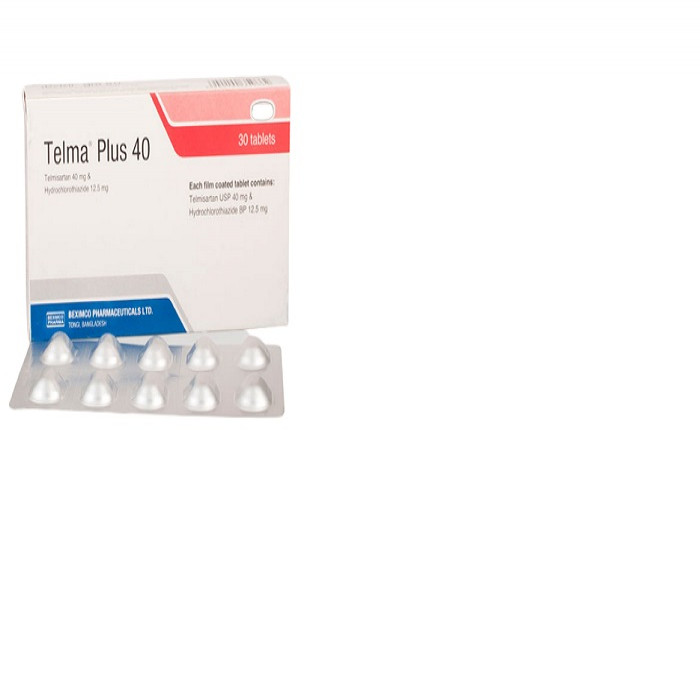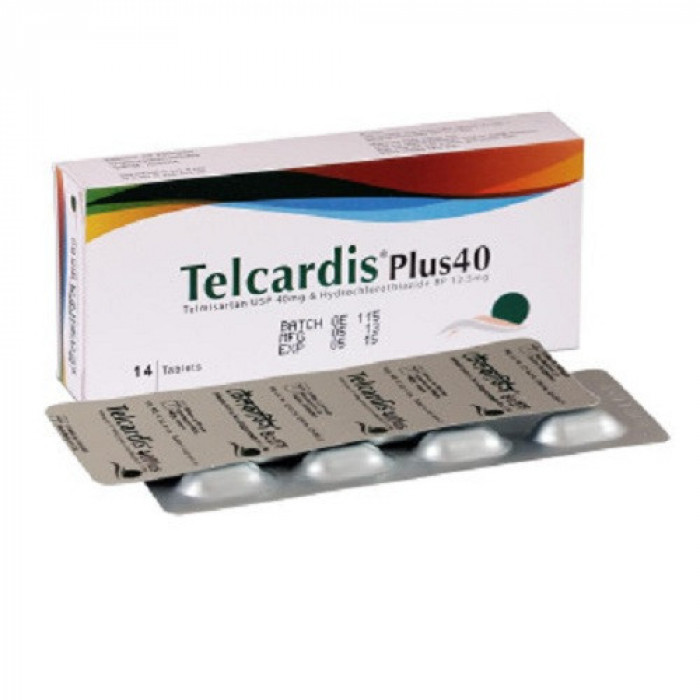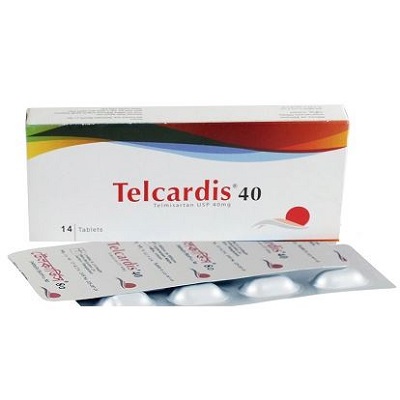
✔ 100% Authentic Product
👁️ Currently Viewing 1213
Telma Plus 40mg 10pcs
Tablet, generic name Telmisartan + Hydrochlorothiazide 40 mg+12.5 mg, Beximco Pharmaceuticals Ltd.
Discount
Price: ৳ 118
MRP:
৳
125
6%
Off

100% Genuine Products, Guaranteed

Safe & Secure Payments, Always

Fast, Secure & Efficient Delivery

Proper Packaging
 Cash on Delivery - All over Bangladesh
Cash on Delivery - All over Bangladesh Regular Delivery - 12-24 Hours, Dhaka City* Charge Tk.39-59
Regular Delivery - 12-24 Hours, Dhaka City* Charge Tk.39-59 Regular Delivery - 24-48 Hours, Other Cities* Charge Tk.99-110
Regular Delivery - 24-48 Hours, Other Cities* Charge Tk.99-110
 ফ্রি ডেলিভারিঃ - ৯৯৯ টাকা+ অর্ডারে, ঢাকা
শহরে
ফ্রি ডেলিভারিঃ - ৯৯৯ টাকা+ অর্ডারে, ঢাকা
শহরে ফ্রি ডেলিভারিঃ - ২৯৯৯ টাকা+ অর্ডারে, ঢাকার
বাহিরে
ফ্রি ডেলিভারিঃ - ২৯৯৯ টাকা+ অর্ডারে, ঢাকার
বাহিরে
100% Genuine Products, Guaranteed
Safe & Secure Payments, Always
Fast, Secure & Efficient Delivery
Proper Packaging
 Cash on Delivery - All over Bangladesh
Cash on Delivery - All over Bangladesh Regular Delivery - 12-24 Hours, Dhaka City* Charge Tk.39-59
Regular Delivery - 12-24 Hours, Dhaka City* Charge Tk.39-59 Regular Delivery - 24-48 Hours, Other Cities* Charge Tk.99-110
Regular Delivery - 24-48 Hours, Other Cities* Charge Tk.99-110 ফ্রি ডেলিভারিঃ - ৯৯৯ টাকা+ অর্ডারে, ঢাকা
শহরে
ফ্রি ডেলিভারিঃ - ৯৯৯ টাকা+ অর্ডারে, ঢাকা
শহরে ফ্রি ডেলিভারিঃ - ২৯৯৯ টাকা+ অর্ডারে, ঢাকার
বাহিরে
ফ্রি ডেলিভারিঃ - ২৯৯৯ টাকা+ অর্ডারে, ঢাকার
বাহিরে
✅ Description:
Indications
Telmisartan and hydrochlorothiazide is indicated for the treatment of hypertension, to lower blood pressure. Lowering blood pressure reduces the risk of fatal and nonfatal cardiovascular events, primarily strokes and myocardial infarctions. These benefits have been seen in controlled trials of antihypertensive drugs from a wide variety of pharmacologic classes including the classes to which this drug principally belongs. There are no controlled trials demonstrating risk reduction with Telmisartan and Hydrochlorothiazide.
Control of high blood pressure should be part of comprehensive cardiovascular risk management, including, as appropriate, lipid control, diabetes management, antithrombotic therapy, smoking cessation, exercise, and limited sodium intake. Many patients will require more than one drug to achieve blood pressure goals. For specific advice on goals and management, see published guidelines, such as those of the National High Blood Pressure Education Program's Joint National Committee on Prevention, Detection, Evaluation, and Treatment of High Blood Pressure (JNC).
Numerous antihypertensive drugs, from a variety of pharmacologic classes and with different mechanisms of action, have been shown in randomized controlled trials to reduce cardiovascular morbidity and mortality, and it can be concluded that it is blood pressure reduction and not some other pharmacologic property of the drugs, that is largely responsible for those benefits. The largest and most consistent cardiovascular outcome benefit has been a reduction in the risk of stroke, but reductions in myocardial infarction and cardiovascular mortality also have been seen regularly.
Elevated systolic or diastolic pressure causes increased cardiovascular risk, and the absolute risk increase per mmHg is greater at higher blood pressures, so that even modest reductions of severe hypertension can provide substantial benefit. Relative risk reduction from blood pressure reduction is similar across populations with varying absolute risk, so the absolute benefit is greater in patients who are at higher risk independent of their hypertension (for example, patients with diabetes or hyperlipidemia), and such patients would be expected to benefit from more aggressive treatment to a lower blood pressure goal.
Some antihypertensive drugs have smaller blood pressure effects (as monotherapy) in black patients, and many antihypertensive drugs have additional approved indications and effects (e.g., on angina, heart failure, or diabetic kidney disease). These considerations may guide the selection of therapy
Telmisartan and Hydrochlorothiazide is not indicated for initial therapy for the treatment of hypertension
Telmisartan and Hydrochlorothiazide may be used alone or in combination with other antihypertensive agents.
Pharmacology
Telmisartan: Angiotensin II is formed from angiotensin I in a reaction catalyzed by angiotensin-converting enzyme (ACE, kininase II). Angiotensin II is the principal pressor agent of the renin-angiotensin system, with effects that include vasoconstriction, stimulation of synthesis and release of aldosterone, cardiac stimulation, and renal reabsorption of sodium. Telmisartan blocks the vasoconstrictor and aldosteronesecreting effects of angiotensin II by selectively blocking the binding of angiotensin II to the AT1 receptor in many tissues, such as vascular smooth muscle and the adrenal gland. Its action is therefore independent of the pathways for angiotensin II synthesis.
There is also an AT2 receptor found in many tissues, but AT2 is not known to be associated with cardiovascular homeostasis. Telmisartan has much greater affinity ( >3,000-fold) for the AT1 receptor than for the AT2 receptor.
Telmisartan does not inhibit ACE (kininase II) nor does it bind to or block other hormone receptors or ion channels known to be important in cardiovascular regulation.
Blockade of the angiotensin II receptor inhibits the negative regulatory feedback of angiotensin II on renin secretion, but the resulting increased plasma renin activity and angiotensin II circulating levels do not overcome the effect of telmisartan on blood pressure.
Hydrochlorothiazide: A thiazide diuretic, hydrochlorothiazide is a thiazide diuretic. Thiazides alter the renal tubular processes of electrolyte reabsorption, increasing sodium salt and chloride excretion in about equal quantities. Hydrochlorothiazide's diuretic effect indirectly lowers plasma volume, resulting in an increase in plasma renin activity, Increased aldosterone secretion, increased urine potassium loss, and decreased serum potassium Because angiotensin II mediates the renin-aldosterone connection, coadministration of an ARB tends to counteract the potassium loss associated with these diuretics. The mechanism of thiazide antihypertensive action is not well known.
Dosage & Administration
Initiate a patient whose blood pressure is not adequately controlled with telmisartan monotherapy 80 mg: Telmisartan and hydrochlorothiazide 80 mg/12.5 mg once daily. Dose can be titrated up to 160 mg / 25 mg after 2 to 4 weeks, if necessary.
Initiate a patient whose blood pressure is not adequately controlled by 25 mg once daily of hydrochlorothiazide, or is controlled but who experiences hypokalemia with this regimen: Telmisartan and hydrochlorothiazide 80 mg / 12.5 mg once daily. Dose can be titrated up to 160 mg / 25 mg after 2 to 4 weeks, if necessary.
Telmisartan and hydrochlorothiazide may be administered with other antihypertensive drugs.
Interaction
Lithium, kaliuretic diuretics, laxatives, corticosteroids, ACTH, amphotericin, carbenoxolone, penicillin G, salicylates, K-sparing diuretics, K supplements, K salt substitutes, drugs that cause hyperkalaemia, digitalis glycosides, digitalis glycosides, digitalis glycosides, digitalis glycosides, digitalis glycosides, digitalis glycosides, digitalis glycol, alcohol, barbiturates, narcotics, oral diabetes medications, insulin, anion-exchange resins, NSAIDs, nondepolarizing skeletal muscle relaxants, pressor amines, allopurinol, Ca salts, beta-blockers, diazoxide, anticholinergics, amantadine, cytotoxics
Contraindications
Telmisartan with hydrochlorothiazide are not recommended:
In people who are hypersensitive to any of the ingredients in this product
In patients suffering from anuria.
In diabetic individuals, for use in conjunction with aliskiren.
Side Effects
Telmisartan: upper respiratory infection (7%), urinary tract infection (1%), back discomfort (3%), diarrhea (3 percent ), Myalgia (3%), Fatigue (1%), Sinusitis (3%), Peripheral edema (1%), Chest discomfort (1%), Hypertension (1%), Dyspepsia (1%). (1 percent ), Headache (1%), dizziness (1%), and pharyngitis (1%). (1 percent )
Anorexia, epigastric discomfort, hypotension, orthostatic hypotension, photosensitivity, anaphylaxis are all side effects of hydrochlorothiazide. Anemia, confusion, erythema multiforme, Stevens-Johnson syndrome, exfoliative dermatitis with toxic epidermal necrolysis Dizziness, Hyperuricemia, Hypokalemia and/or Hypomagnesemia.
Pregnancy & Lactation
Pregnancy Category D. Use of drugs that act on the renin-angiotensin system during the second and third trimesters of pregnancy reduces fetal renal function and increases fetal and neonatal morbidity and death. Resulting oligohydramnios can be associated with fetal lung hypoplasia and skeletal deformations. Potential neonatal adverse effects include skull hypoplasia, anuria, hypotension, renal failure, and death. When pregnancy is detected, discontinue Telmisartan and hydrochlorothiazide as soon as possible.
Nursing Mothers: It is not known whether telmisartan is excreted in human milk, but telmisartan was shown to be present in the milk of lactating rats. Thiazides appear in human milk. Because of the potential for adverse effects on the nursing infant, decide whether to discontinue nursing or discontinue the drug, taking into account the importance of the drug to the mother.
Precautions & Warnings
Hepatic insufficiency, biliary obstruction, renal impairment, and renal artery stenosis are all possible diagnoses. Before beginning therapy, correct any volume depletion. Serum potassium levels should be checked on a frequent basis, especially in elderly and renally impaired individuals.
Storage Conditions
Keep at 25° C. Tablets should not be taken from their blisters until they are about to be administered.
⚠️Disclaimer:
At ePharma, we’re committed to providing accurate and accessible health information. However, all content is intended for informational purposes only and should not replace medical advice from a qualified physician. Please consult your healthcare provider for personalized guidance. We aim to support, not substitute, the doctor-patient relationship.








